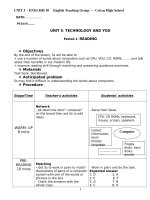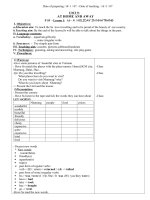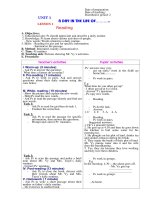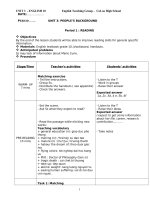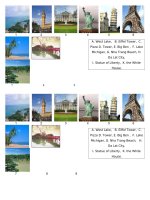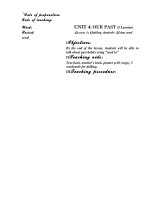Giao an Unit 1,2,3
Bạn đang xem bản rút gọn của tài liệu. Xem và tải ngay bản đầy đủ của tài liệu tại đây (146.87 KB, 16 trang )
Date of preparation:
Date of teaching:
Distributive period: 2
Unit 1
A day in the life of………..
Lesson 1
Reading
A. Objectives:
1. Educational aim: Ps should appreciate and describe a daily routine.
2. Knowledge: Ps learn about various activities of people.
- New words: Words related to a daily routine.
3. Skills: - Reading for gist and for specific information.
- Summarize the passage.
B. Method: Integrated, mainly communicative.
C. Time: 45 minutes
D. Teaching aids: Pictures showing Mr. Vy’s activities.
E. Procedure:
Teacher’s activities Pupils’ activities
I. Warm-up: (5 minutes)
- Ask Ps to answer the question:
What does a farmer do everyday?
II. Pre-reading ( 7 minutes)
- Ask Ps to work in pairs. Ask and answer
questions about their daily routine using the
cues below.
III. While- reading ( 19 minutes)
- Show the picture and explain the new words.
- Help Ps read the new words.
- Ask Ps to read the passage silently and find out
new words.
Task 1:
- Ask Ps to read for gist then do task 1.
- Conduct the correction.
Task 2:
- Ask Ps to read the passage for specific
information, then answer the questions.
- Prompt and correct Ps’ mistakes.
Ps’ answers may vary.
- get up early/ work in the field/ go
home late ..………
- Ps work in pairs.
E.g
What time do you often get up?
- I often get up at 6 o’clock.
- Answer T’s questions.
- Ps copy new words.
- Reading
- Ps do the task.
- Answer:
1. C 2. C 3. A 4. A
- Reading
- Ps work in pairs.
Suggested answers:
1. He’s a peasant/ farmer.
2. He gets up at 4.30 and then he goes down
the kitchen to boil some water for his
morning tea.
3. He ploughs on his plot of land, drinks tea
and smokes tobacco during his break.
4. They repair the banks of their plot of land.
Mr. Vy pumps water into it and his wife
does the transplanting.
5. Yes, they are because they love working
and they love their children.
Task 3:
- Ask Ps to scan the passage and make a brief
note about Mr. Vy and Mrs. Tuyet’s daily
routines.
- Correct Ps’ mistakes.
IV. Post-reading (13 minutes)
- Ask Ps to close the book, discuss with
their friends about Mr. Vy and Mrs.
Tuyet’s daily routines.
V. Homework ( 1 minute)
- Ask Ps to write a short passage about their
mother or father’s daily routine.
- Do exercises in student book.
- Ps work in groups.
E.g
In the morning: 4.30 –the alarm goes off.
- Mr. Vy gets up
…………………..
…………………..
- Ps work in groups.
- At home
Date of preparation:
Date of teaching:
Distributive period: 3
Lesson 2
Speaking
A. Objectives:
1. Educational aim: Ps should give information about their daily activities.
2. Knowledge:
- General knowledge: Through this lesson Ps know how to ask and answer about daily
activities.
- New words: Words related to daily activities.
3. Skills: - Fluency in speaking about daily activities.
B. Method: Integrated, mainly communicative.
C. Time: 45 minutes
D. Teaching aids: Pictures about Mr. Quan’s activities, clock.
E. Procedure:
Teacher’s activities Pupils’ activities
I. Homework: (5 minutes)
- Ask Ps to speak about their mother/ father’s
daily routine.
II. Pre-speaking ( 10 minutes)
- Ask Ps to work in pairs. Ask and answer
questions about their daily routine using the
cues below.
- Ask Ps to count how many subjects they have
in high school.
Task 1:
- Ask Ps to look at Quan’s weekly timetable and
work in pairs. Ask and answer like this:
E.g
Which lessons does Quan have to learn on
Monday?
- He has to learn…………
III. While- speaking ( 10 minutes)
- Show the pictures and explain the new words if
there are any.
- Speak freely.
- Revise how to tell the time.
Suggested answers: Maths, Literature,
History, Biology, English, Chemistry,
Physics, Geography, Physical Education,
Information Technology……
- Ps work in pairs.
- Ps do the task.
- Ps work in groups.
Task 2:
- Ask Ps to describe the pictures.
- Conduct the correction.
IV. Post-speaking (18 minutes)
Task 3:
- Ask Ps to close the book, then tell their
classmates about their daily activities.
- Correct Ps’ mistakes.
V. Homework ( 2 minutes)
- Ask Ps to write a short passage about their
daily activities .
- Do exercises in student book.
E.g
At 2 p.m, Quan gets up after taking a short
nap. At 2.15, he studies his lessons/ does his
homework.
- Ps work in groups.
- Ps in groups call out a pupil to say their
daily activities.
- At home
Date of preparation:
Date of teaching:
Distributive period: 4
Lesson 3
Listening
A. Objectives:
1. Educational aim:
- Ps should know how to appreciate and take part in daily activities to describe their own daily
activities.
- New words: Words related to daily activities.
2. Skills: - Listening for gist and for specific information.
B. Method: Integrated, mainly communicative.
C. Time: 45 minutes
D. Teaching aids: Pictures about Mr. Quan’s activities, clock.
E. Procedure:
Teacher’s activities Pupils’ activities
I. Warm- up: (5 minutes)
- Ask Ps to play a game: Jumbled words
CCLOY, RIEDV, NESSEGERPA, DOFO
SALLT.
- Check and lead Ps to the lesson.
II. Pre-listening ( 8 minutes)
Activity 1:
- Ask Ps to answer some questions:
1. Have you ever seen a cyclo?
2. When did you see it?
3. Which do you prefer, going by cyclo or
bicycle? Why/ why not?
Activity 2:
- Read the given words, explain and
transcribe them.
- Help Ps read them aloud.
III. While- listening ( 22 minutes)
- Show the pictures and ask Ps to describe the
pictures.
- Check Ps’ sentences.
- Conduct the correction.
- Class work.
Answers: cyclo, driver, passenger, foot stall.
- Ps work in pairs.
Suggested answers:
Yes, I have/ No, I never.
I saw it .………
I’d prefer to go by cyclo rather than
bicycle because I will have time to relax.
- Reading practice
- Ps work in pairs.
E.g
In the 1
st
picture: I can see a cyclo driver, .…
- Lead to the lesson: You will hear Mr. Lam, a
cyclo driver in Ho Chi Minh City talking
about .……
Task 1:
- Turn on the radio the first time.
- Ask Ps to do task 1.
Task 2:
- Ask Ps to listen to the radio again, then
tick (T) if they are correct and (F) if they
are incorrect. Then explain why.
- Conduct the correction.
IV. Post-listening (10 minutes)
- Ask Ps to work in pairs: Ask and answer
about Mr. Lam daily activities.
- Ask Ps to retell the story in front of the
class.
- Correct Ps’ mistakes.
V. Homework ( 2 minute)
- Ask Ps to write a short passage about Mr.
Lam’s daily activities . (50 words)
- Do exercises in student book.
- Listen to the teacher.
- Listen to the radio.
- Do task 1 in groups.
Answers;
1. e 2. f 3. a 4. c 5. b 6. d
Answers:
1. F 2. T 3. F 4. F 5. F 6. F
- Ps work in pairs.
- Ps work individually.
- At home
Date of preparation:
Date of teaching:
Distributive period: 5
Lesson 4
Writing
A. Objectives:
- Ps learn about the organization of the content on a narrative.
- The connectors ( time expressions)
- Writing a narrative.
B. Method: Integrated, mainly communicative.
C. Time: 45 minutes
D. Teaching aids: A narrative.
E. Procedure:
Teacher’s activities Pupils’ activities
I. Warm- up: (7 minutes)
- Ask Ps some questions to lead them to the
lesson.
* Have you ever heard a frightening/ an
interesting story?
* When/ Where did it happen?
* How did you feel about that?
II. Pre-writing ( 10 minutes)
Task 1:
- Ask Ps to read the narrative, find out the new
words.
- Explain the new words if there are any and
transcribe them.
- Help Ps read the new words.
- Class work.
Suggested answers.
Ps’ answers may vary.
- Ps work in pairs.
Suggested answers:
Yes, I have/ No, I never.
I saw it .………
I’d prefer to go by cyclo rather than
bicycle because I will have time to relax.
- Reading practice
- Ask Ps to find out all the verbs that are used in
the past simple tense and the connectors in the
story.
We use the past simple tense to narrative a
story in the past.
Task 2:
- Ask Ps to work in groups. Identify the events,
the climax, and the conclusion of the story.
+ Events: got the plane, plane took off .…
+ Climax: bad weather .………
+ Conclusion of the story: The pilot announced
that right. We landed safely.………
III. While- writing ( 15 minutes)
Task 3:
- Assigns tasks: Each student writes a narrative
about a hotel fire using the prompts below.
- Walk round and help them with the new
words.
IV. Post- writing (10 minutes)
- Give suggestions and corrections.
- Ask Ps to write a narrative.
V. Homework ( 3 minutes)
- Ask Ps to write a complete narrative about the
hotel fire.
- Do exercises in student book.
- Ps work in groups.
- A few pupils are selected to give the
answers.
- Ps work individually.
- Ps’ narratives may vary.
- Ps read their narratives in front of the
class.
- At home
Date of preparation:
Date of teaching:
Distributive period: 6
Lesson 5
Language focus
A. Objectives:
- Ps should distinguish between / i / and / i: /
- Ps revise the simple present tense and simple past tense.
B. Method: Integrated, mainly communicative.
C. Time: 45 minutes
D. Teaching aids: Handout
E. Procedure:
Teacher’s activities Pupils’ activities
I. Warm- up: (10 minutes)
- Ask Ps to go to the board and write the words
which they can hear.
- Read words:
Sit, seat, ship, sheep, it, eat, meet, meat ..…
- Ask Ps to divide these words into two groups.
- Conduct the correction.
- Focus on differences.
II. Pronunciation ( 10 minutes)
1. Vowels: / i/ and / i:/
* Ask Ps the differences between/ i/ and / i:/.
- Help Ps read them.
- Write the words.
- Take notes.
- Listen and practice reading.
- Introduce some minimal pairs and help Ps read
them.
Sheep, ship, bean, bin, eat, it, lick( liÕm), leek,
cheeks, chicks, seen, since ..…
* Ask Ps to open the book then read after the
teacher.
- Ask Ps to find the vowels: / i/ and / i:/ in the
following sentences, then practise reading in the
sentences.
III.Grammar and vocabulary (20 minutes)
1. Simple present tense
- Ask Ps to retell the usage, form and formation
of verbs in the simple present tense.
- Ask Ps to give examples.
- Walk round and help them with the new
words.
* Exercise 1:
- Ask Ps to give examples.
- Conduct the correction.
1. is 2. fish 3. worry 4. are 5. catch
6. am 7. catch 8. go 9. give up
10. says 11. realize 12. am
2. Adverbs of frequency
- Explain the meaning.
- Focus on usage, position.
+ Usage: Møc ®é thêng xuyªn cña hµnh ®éng.
+ Position: - As a rule: §Çu c©u.
- Tríc ®t thêng, sau Tobe
* Exercise 2:
- Explain the meaning.
- Check correction.
3. Simple past tense
- Explain the meaning.
- Ask Ps to give examples.
-Walk round and help them with the new words.
* Exercise 3:
- Ask Ps to supply the correct past simple form
of the verbs.
1. was done 2. cooked 3. were 4. smelt
5. told 6. sang 7. began 8. felt
9. put out 10. crept 11. slept 12. woke
13. was 14. leapt 15. hurried 16. found
17. wound 18. flowed
IV. Comments (3 minutes)
- Give comments
V. Homework ( 2 minutes)
- Do exercises in student book.
- Reading practice.
- Ps divide into two kinds.
- Reading practice
/ i/ : film, Jim, it
/ i:/ : bean, meat, leave, pea, cheese
- Ps work individually.
+ Verbs: +es, +s: she, he, it
+ Form:……………
+ Usage: ..……………
- Ps give examples.
- A few pupils are selected to give the
answers.
- Ps work individually.
- Listen and take notes.
- Give examples.
- Put them in appropriate place.
- Ps work in pairs.
+ Verbs: +V-ed
+ Form:……………
+ Usage: ..……………
- Ps give examples.
- Do the task.
- Listen
- At home
Date of preparation:
Date of teaching:
Distributive period: 7
Unit 2
School talks
Lesson 1
Reading
A. Objectives:
- Ps should know how to get specific information in a passage.
- Skills: + Reading for gist and for specific information.
+ Summarize the passage.
B. Method: Integrated, mainly communicative.
C. Time: 45 minutes
D. Teaching aids:
E. Procedure:
Teacher’s activities Pupils’ activities
I. Warm-up: (5 minutes)
- Ask Ps to answer the question to lead Ps to the
lesson:
+ What do you often talk about when you meet
each other?
+ Which topics do you like talking about?
II. Pre-reading ( 8 minutes)
- Ask Ps to look at the following topics, then
discuss:
Which topics do you often talk about? Explain
why?
- Correct Ps’ grammatical mistakes.
III. While- reading ( 15 minutes)
- Ask Ps to scan the following small talks to get
the main ideals.
- Explain the new words.
- Help Ps read the new words.
- Ask Ps to do task 1 after reading the passage
for the first time.
Task 1:
- Ask Ps to read 5 sentences quickly then find
out the necessary words in the blanks belong to
any groups: verbs, adjs or advs.
- Conduct the correction.
Task 2:
- Ask Ps to read the small talks and find
out who .………
- Ask Ps do task 2.
- Prompt and correct Ps’ mistakes.
Ps’ answers may vary.
- get up early/ work in the field/ go
home late ..………
- Ps work in pairs.
- Answer T’s question.
- Ps’ answers are different.
- Reading practice
- Ps do the task.
- Answer:
1. C 2. C 3. A 4. A
- Reading
- Ps work in pairs.
Suggested answers:
1. Traffic 2. Biggest
3. International language
4. Crowded 5. Worry
- Read the passage for specific
information.
- Ps work in groups.
* Answers:
1. Mr. Phuong 5. Mrs. Phong
2. Mr. Phong 6. Mr. Phong
3. Mr. Phong 7. Mr. Phong
4. Mr. Ha 8. Mr. Phong’s father
Task 3:
- Ask Ps to read the questions.
- Explain the new words if there are any.
- Ask Ps to read the passage again.
- Correct Ps’ mistakes.
IV. Post-reading (10 minutes)
- Ask Ps to discuss with their friends
about the following topics without
looking at the book.
- Divide the class into 3 groups.
V. Homework ( 2 minutes)
- Ask Ps to write a complete paragraph about
yourself.
- Do exercises in student book.
- Read the questions.
- Work individually then work in pairs. One
asks and the other answers.
- Ps work in groups.
- Each group has one pupil to talk
about their topic.
- At home
Date of preparation:
Date of teaching:
Distributive period: 8
Lesson 2
Speaking
A. Objectives:
- Ps should know to start and close a conversation.
- Through this lesson Ps should practice speaking small talks.
- New words: Words related to daily activities.
3. Skills: - Fluency in speaking about daily activities.
B. Method: Integrated, mainly communicative.
C. Time: 45 minutes
D. Teaching aids: Handouts.
E. Procedure:
Teacher’s activities Pupils’ activities
I. Warmer: (5 minutes)
- Ask Ps to say what they usually talk when they
meet a friend/ stranger or want to say goodbye.
II. Pre-speaking ( 5 minutes)
- Ask Ps to read the following expressions.
- Explain the meaning and ask Ps to do task 1.
Task 1:
- Ask Ps to look at the table and read the
sentences, then place them under the appropriate
heading.
III. While- speaking ( 20 minutes)
Task 2:
- Ask Ps to read the sentences and find out the
new words.
- Explain the new words.
- Help Ps read the new words.
- Ask Ps to do task 2: Ask Ps to rearrange the
sentences to make a conversation.
- Get feedback.
- Speak freely.
- Ps’ answers may vary.
Hi! How are you today?
Good ..! How do you do?……
See you later.
- Ps work in pairs.
- Ps do the task.
- Find out the new words.
- Reading practice
- Ps do task 2.
- Ps work in pairs.
* Answers:
1. D 2. F 3. B 4. H 5. E 6. C 7. G
